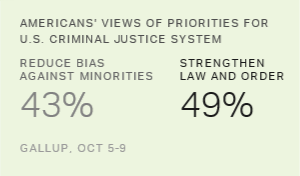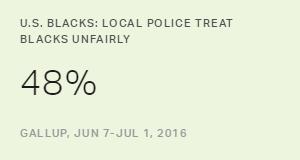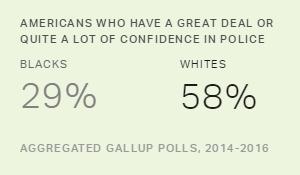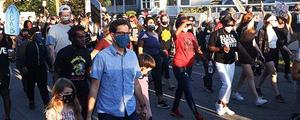Story Highlights
- 49% favor strengthening law and order
- 43% prioritize reducing bias against minorities
- Stark political party differences exist in justice system priorities
WASHINGTON, D.C. -- Americans are almost evenly divided on whether strengthening law and order through more police and greater enforcement of the laws (49%) or reducing bias against minorities in the criminal justice system by reforming court and police practices (43%) should be the higher priority for the U.S. criminal justice system. Republicans prioritize law and order, while Democrats are more likely to say reducing bias is more important.
| Strengthening law and order | Reducing bias against minorities | No opinion | |||||||||||||||||||||||||||||||||||||||||||||||||||||||||||||||||||||||||||||||||||||||||||||||||
|---|---|---|---|---|---|---|---|---|---|---|---|---|---|---|---|---|---|---|---|---|---|---|---|---|---|---|---|---|---|---|---|---|---|---|---|---|---|---|---|---|---|---|---|---|---|---|---|---|---|---|---|---|---|---|---|---|---|---|---|---|---|---|---|---|---|---|---|---|---|---|---|---|---|---|---|---|---|---|---|---|---|---|---|---|---|---|---|---|---|---|---|---|---|---|---|---|---|---|---|
| % | % | % | |||||||||||||||||||||||||||||||||||||||||||||||||||||||||||||||||||||||||||||||||||||||||||||||||
| National adults | 49 | 43 | 8 | ||||||||||||||||||||||||||||||||||||||||||||||||||||||||||||||||||||||||||||||||||||||||||||||||
| Republicans | 77 | 17 | 6 | ||||||||||||||||||||||||||||||||||||||||||||||||||||||||||||||||||||||||||||||||||||||||||||||||
| Independents | 41 | 52 | 8 | ||||||||||||||||||||||||||||||||||||||||||||||||||||||||||||||||||||||||||||||||||||||||||||||||
| Democrats | 32 | 60 | 8 | ||||||||||||||||||||||||||||||||||||||||||||||||||||||||||||||||||||||||||||||||||||||||||||||||
| Gallup, Oct 5-9, 2016 | |||||||||||||||||||||||||||||||||||||||||||||||||||||||||||||||||||||||||||||||||||||||||||||||||||
The latest data, collected Oct. 5-9, reflect stark party differences in approaches to the U.S. justice system -- ones that have been on display throughout the 2016 presidential race.
Trump has declared himself the "law and order candidate," while his vice presidential running mate, Mike Pence, has said that he and Trump "believe there's been far too much of this talk of institutional bias or racism within law enforcement." Meanwhile, Democratic candidate Hillary Clinton has advocated for reform in the criminal justice system to reduce racial and ethnic bias.
More than three in four Republicans (77%) say the bigger priority should be to strengthen law and order through more police and greater enforcement of the laws, while 17% say the priority should be to reduce bias against minorities. Majorities of both Democrats (60%) and independents (52%) prioritize reducing bias against minorities in the criminal justice system by reforming court and police practices. However, Republicans tilt more toward strengthening law and order than both of these groups do toward reducing bias.
Whites, Nonwhites Take Opposing Stances on Criminal Justice Priorities
Largely reflecting their likelihood to lean Republican, a majority of whites (56%) favor strengthening law and order, while 57% of nonwhites -- a group that leans Democratic -- prioritize reducing minority bias. But substantial minorities of both whites and nonwhites take the opposing views.
Americans who live in towns and rural areas are nearly twice as likely to prioritize strengthening law and order over reducing racial and ethnic bias. Among suburban residents, 55% prioritize reducing minority bias, and 40% prioritize strengthening law and order. Residents of large and small cities, however, are evenly divided on the question.
| Strengthening law and order | Reducing bias against minorities | No opinion | |||||||||||||||||||||||||||||||||||||||||||||||||||||||||||||||||||||||||||||||||||||||||||||||||
|---|---|---|---|---|---|---|---|---|---|---|---|---|---|---|---|---|---|---|---|---|---|---|---|---|---|---|---|---|---|---|---|---|---|---|---|---|---|---|---|---|---|---|---|---|---|---|---|---|---|---|---|---|---|---|---|---|---|---|---|---|---|---|---|---|---|---|---|---|---|---|---|---|---|---|---|---|---|---|---|---|---|---|---|---|---|---|---|---|---|---|---|---|---|---|---|---|---|---|---|
| % | % | % | |||||||||||||||||||||||||||||||||||||||||||||||||||||||||||||||||||||||||||||||||||||||||||||||||
| National adults | 49 | 43 | 8 | ||||||||||||||||||||||||||||||||||||||||||||||||||||||||||||||||||||||||||||||||||||||||||||||||
| Whites | 56 | 38 | 6 | ||||||||||||||||||||||||||||||||||||||||||||||||||||||||||||||||||||||||||||||||||||||||||||||||
| Nonwhites | 33 | 57 | 10 | ||||||||||||||||||||||||||||||||||||||||||||||||||||||||||||||||||||||||||||||||||||||||||||||||
| Large/Small city | 45 | 48 | 8 | ||||||||||||||||||||||||||||||||||||||||||||||||||||||||||||||||||||||||||||||||||||||||||||||||
| Suburb | 40 | 55 | 5 | ||||||||||||||||||||||||||||||||||||||||||||||||||||||||||||||||||||||||||||||||||||||||||||||||
| Town/Rural area | 59 | 31 | 11 | ||||||||||||||||||||||||||||||||||||||||||||||||||||||||||||||||||||||||||||||||||||||||||||||||
| Gallup, Oct 5-9, 2016 | |||||||||||||||||||||||||||||||||||||||||||||||||||||||||||||||||||||||||||||||||||||||||||||||||||
Bottom Line
Criminal justice statistics show that blacks and Hispanics are much more likely than whites to be searched, arrested, detained and imprisoned, and many Americans feel this is an issue that needs addressing. Views on priorities for criminal justice reform, however, are largely divided along political lines. But while law and order is a popular rallying cry within the GOP, some Republicans are attempting to address institutional race disparities in the criminal justice system, such as House Speaker Paul Ryan's efforts at sentencing reform, which have bipartisan support.
The future of criminal justice reform largely hinges on who assumes the presidency in January, as each major party candidate has taken a starkly different approach toward the issue.
These data are available in Gallup Analytics.
Survey Methods
Results for this Gallup poll are based on telephone interviews conducted Oct. 5-9, 2016, on the Gallup U.S. Daily survey, with a random sample of 1,017 adults, aged 18 and older, living in all 50 U.S. states and the District of Columbia. For results based on the total sample of national adults, the margin of sampling error is ±4 percentage points at the 95% confidence level. All reported margins of sampling error include computed design effects for weighting.
Each sample of national adults includes a minimum quota of 60% cellphone respondents and 40% landline respondents, with additional minimum quotas by time zone within region. Landline and cellular telephone numbers are selected using random-digit-dial methods.
View survey methodology, complete question responses and trends.
Learn more about how the Gallup Poll Social Series works.




